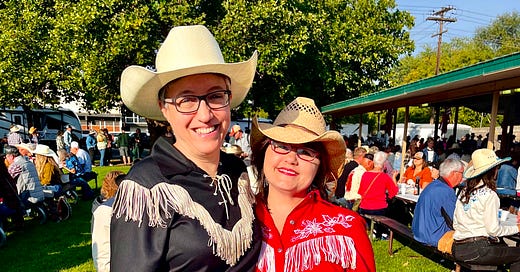First Lady's second act
A year after being ushered off stage, Aimee Kotek Wilson again has a leading role in Tina Kotek's floundering mental health and addiction efforts
Aimee Kotek Wilson kicked off the first meeting of the 22-member Oregon Behavioral Health* Talent Council, chaired by Kotek Wilson, last week with introductions and an icebreaker question: “If you could wave a magic wand, what is one thing you would change right now to improve the behavioral health workforce crisis in Oregon?”
By way of introduction, Kotek Wilson announced her “professional background is as a social worker, and I’m Oregon’s First Lady.” According to a Willamette Week article from May 2024, Kotek Wilson, 48, worked as a social worker for approximately three years, from 2018 to 2021.
Kotek Wilson omitted from her introduction the bulk of her professional experience. Before her stint as a social worker, Kotek Wilson worked to help elect Democrats to the Oregon legislature and lobbied for the Service Employee International Union, which today represents 72,000 employees of state and local government and lavishes campaign riches on Democratic candidates, who repay the generosity with pay raises and job security for SEIU members.
In response to her own icebreaker question, Kotek Wilson, appearing to read from the screen in front of her, said,
I’m a Marvel fan, and so those movies always start with assembling a team of superheroes. And so, I feel like, if I had a magic wand, I would bring together the people doing the work to develop the solutions to improve the system, just like this Council is going to do. Which is why I’m just so excited about this project.
Tina Kotek presides over a state that consistently ranks near the bottom in addiction and mental health metrics. Upon taking office in January 2023, the Governor identified behavioral health as one of only three priority areas that consume her attention. She gave Kotek Wilson a leading and wide-ranging behavioral health role in 2023, referring to Kotek Wilson’s history in social work and her own struggles with mental health and addiction.
By February 2024, Kotek’s top staff were frustrated with Kotek Wilson’s leading role in developing and implementing behavioral health policies for her wife’s administration. Special Advisor Abby Tibbs emailed Kotek that she was concerned the governor had failed to “provide clear and consistent direction” to inform her administration’s behavioral health work plan. Kotek responded,
[Behavioral Health] is complex. We spent a good part of the first year staffing up, understanding the landscape, and opportunistically addressing issues. We need to be more intentional in 2024 so we can understand if we are making progress.
This remarkable admission, made more than one year into Kotek’s term, that she then lacked the framework to even “understand if we are making progress” on one of her key focus areas has still been reported by no outlet other than Oregon Roundup. Whatever intentionality may or may not have materialized in 2024 once again takes a back seat to the Kotek Wilson behavioral health show that confounded the administration in 2023.
The fallout from Kotek Wilson’s first foray into policy leadership was dramatic - the Governor’s Chief of Staff, the aforementioned Abby Tibbs and a handful of other top staffers quit because they disagreed with Kotek Wilson’s role, which of course existed outside the usual staff chain of command. It is only due to those abrupt departures that Oregonians know about Kotek’s desire to elevate her wife in her administration, damn the consequences for Oregonians.
On May 1, 2024, Kotek sought to put the First Lady flap behind her in a lengthy press conference, in which Kotek clarified there would not be an “office of the First Lady,” and laying out what Kotek Wilson’s role would be going forward. Kotek said her wife would continue to be involved in behavioral health, but also announced, in an allusion to the mass staff departures, “Other than staff that is assigned to support the first lady in her official duties, no staff will report to her or be supervised by her.”
That sentence, like much of Kotek’s press conference, is designed to sound decisive but in fact offers little guidance or constraints on Kotek or her wife. The concern was not then, and is not now, that staff will report to Kotek Wilson regarding her personal life. The problem is Kotek Wilson’s official duties, Kotek’s obfuscation about the extent of those duties, and whether Kotek Wilson contributes to the well-being of Oregonians in executing her official duties.
For what it’s worth, there are five staff members from the Governor’s Office who are staffing the Council, including Kotek’s Deputy Chief of Staff Taylor Smiley Wolfe, according to the agenda for its inaugural meeting. Presumably, that staff will play a key role in developing the Council’s report to the Governor regarding what it recommends to fix what Kotek believes is a critical workforce shortage.
Kotek Wilson closed the May 28 meeting on a cheerful note, “We are really, uh, identifying the core issues.” She also forecast the focus of the next Council meeting, scheduled for June 12:
“And then, the goal of our next meeting is to really get into this discussion of subcommittees . . . there are different topics that need to get broken down . . . and we really need to get into it, different ideas, different solutions.”
Two-and-a-half years into her term, Kotek’s behavioral health initiative relies on her wife leading a 22-person committee which in its second meeting will focus on subcommittees.
Is that intentional?
*Oregon uses the term “behavioral health” to describe programs the stated purpose of which are to help people suffering from mental illness and addiction.




